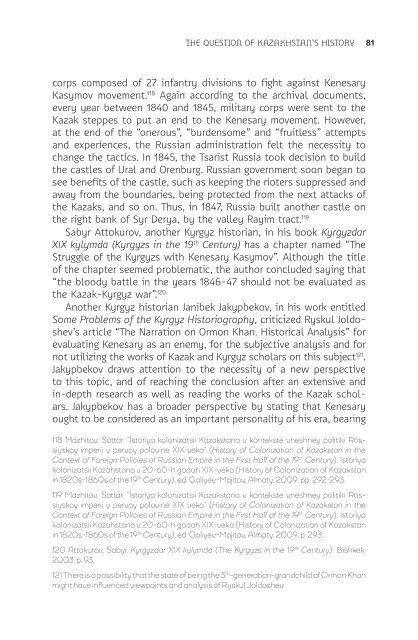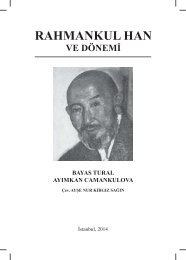THE SOVIET HISTORIOGRAPHY AND THE QUESTION OF KAZAKHSTAN’S HISTORY
SOVYET-TARIH-YAZICILIGI-ENG
SOVYET-TARIH-YAZICILIGI-ENG
Create successful ePaper yourself
Turn your PDF publications into a flip-book with our unique Google optimized e-Paper software.
<strong>THE</strong> <strong>QUESTION</strong> <strong>OF</strong> <strong>KAZAKHSTAN’S</strong> <strong>HISTORY</strong> 81<br />
corps composed of 27 infantry divisions to fight against Kenesary<br />
Kasymov movement. 118 Again according to the archival documents,<br />
every year between 1840 and 1845, military corps were sent to the<br />
Kazak steppes to put an end to the Kenesary movement. However,<br />
at the end of the “onerous”, “burdensome” and “fruitless” attempts<br />
and experiences, the Russian administration felt the necessity to<br />
change the tactics. In 1845, the Tsarist Russia took decision to build<br />
the castles of Ural and Orenburg. Russian government soon began to<br />
see benefits of the castle, such as keeping the rioters suppressed and<br />
away from the boundaries, being protected from the next attacks of<br />
the Kazaks, and so on. Thus, in 1847, Russia built another castle on<br />
the right bank of Syr Derya, by the valley Rayim tract. 119<br />
Sabyr Attokurov, another Kyrgyz historian, in his book Kyrgyzdar<br />
XIX kylymda (Kyrgyzs in the 19 th Century) has a chapter named “The<br />
Struggle of the Kyrgyzs with Kenesary Kasymov”. Although the title<br />
of the chapter seemed problematic, the author concluded saying that<br />
“the bloody battle in the years 1846-47 should not be evaluated as<br />
the Kazak-Kyrgyz war”. 120<br />
Another Kyrgyz historian Janibek Jakypbekov, in his work entitled<br />
Some Problems of the Kyrgyz Historiography, criticized Ryskul Joldoshev’s<br />
article “The Narration on Ormon Khan. Historical Analysis” for<br />
evaluating Kenesary as an enemy, for the subjective analysis and for<br />
not utilizing the works of Kazak and Kyrgyz scholars on this subject 121 .<br />
Jakypbekov draws attention to the necessity of a new perspective<br />
to this topic, and of reaching the conclusion after an extensive and<br />
in-depth research as well as reading the works of the Kazak scholars.<br />
Jakypbekov has a broader perspective by stating that Kenesary<br />
ought to be considered as an important personality of his era, bearing<br />
118 Mazhitov, Sattar. “İstoriya kolonizatsii Kazakstana v kontekste vneshney politiki Rossiyskoy<br />
imperii v pervoy polovine XIX veka” (History of Colonization of Kazakstan in the<br />
Context of Foreign Policies of Russian Empire in the First Half of the 19 th Century), İstoriya<br />
kolonizatsii Kazahstana v 20-60-h godah XIX-veka (History of Colonization of Kazakstan<br />
in 1820s-1860s of the 19 th Century), ed. Galiyev-Majitov, Almaty, 2009, pp. 292-293.<br />
119 Mazhitov, Sattar. “İstoriya kolonizatsii Kazakstana v kontekste vneshney politiki Rossiyskoy<br />
imperii v pervoy polovine XIX veka” (History of Colonization of Kazakstan in the<br />
Context of Foreign Policies of Russian Empire in the First Half of the 19 th Century), İstoriya<br />
kolonizatsii Kazahstana v 20-60-h godah XIX-veka (History of Colonization of Kazakstan<br />
in 1820s-1860s of the 19 th Century), ed. Galiyev-Majitov, Almaty, 2009, p. 293.<br />
120 Attokurov, Sabyr. Kyrgyzdar XIX kylymda (The Kyrgyzs in the 19 th Century). Bishkek,<br />
2003, p. 93.<br />
121 There is a possibility that the state of being the 5 th -generation-grandchild of Ormon Khan<br />
might have influenced viewpoints and analysis of Ryskul Joldoshev.



